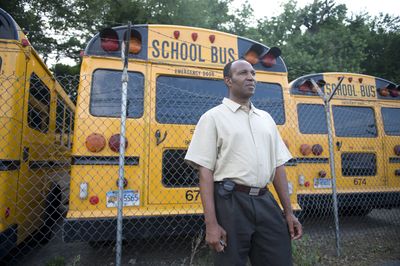State measures would require paid sick days

HARTFORD, Conn. – For school bus driver Jamille Aine, a cold is more than an inconvenience. His employer does not offer paid sick days, so if he can’t shake the bug, he may not be able to pay his bills.
Some 46 million U.S. workers lack paid sick days, but lawmakers in 12 states – including California, Connecticut, Minnesota and West Virginia – have proposed legislation in the past year that would require businesses to provide them.
Dale Butland of Ohioans for Healthy Families, an advocacy group pushing a November ballot initiative that would require employers to offer paid sick days, said the effort picked up steam in Columbus and other state capitals because federal legislation has stalled.
“This is the next frontier in assuring workplaces are safe,” said Kate Kahan, director of the work and family program at the Washington-based National Partnership for Women & Families, which lobbies on paid sick leave and other workplace and health care issues.
Businesses – especially small companies – argue that forcing them to offer paid sick days hinders their ability to provide a flexible array of benefits, such as a mix of vacation and personal days that also may be used by employees when they are sick. And they say it’s a costly new mandate for businesses already struggling through a contracting economy.
Bills requiring paid sick days were rejected or allowed to die in several state legislatures. Maine lawmakers rejected a paid sick leave bill. And for the second consecutive year, legislation died in the Connecticut House of Representatives after the state Senate passed it, leading a key Senate backer to say she’s lost hope.
“Unless some kind of miracle happens, I don’t see it,” said Sen. Edith Prague, a Democrat from eastern Connecticut.
But in several other states – Alaska, Minnesota, Vermont and West Virginia – legislation failed when lawmakers refused to take up paid sick leave bills before legislative deadlines passed, according to the National Partnership for Women & Families. In California, legislation passed the Assembly but is dead for the legislative session after being held in a Senate committee. The bill’s author said she plans to reintroduce it next year.
Nearly all large companies already offer paid sick leave to at least some of their workers, but state and federal mandates could require them to expand the benefit.
Kahan and other workers advocates believe paid sick time should be an employment standard, like the federal minimum wage.
Advocates say the benefit is particularly needed for employees who handle food or work with children.
Aine, who drives Stamford students ages 3 to 17 to school, cited that as a reason he would like to have the financial flexibility to stay home when he’s sick.
“It’s not just for me, but for the people you drive,” he said.
The federal Bureau of Labor Statistics estimates that 43 percent of the private industry labor force worked in 2007 without paid sick time, a group primarily made up of low-paid employees at small businesses.
Workers advocates have been pushing the issue since 1993, when the Family and Medical Leave Act was signed into law, requiring employers to provide up to 12 weeks of unpaid leave a year. While federal legislation was first proposed in 2004, it may have a shot at passing next year if Democrats control the White House and Congress after the November elections, said the bill’s sponsor, Rep. Rosa DeLauro, D-Conn.
Wal-Mart Stores Inc., the world’s largest retailer, gives paid sick days to employees who work more than 34 hours a week. The company has not taken a position on the proposed federal law, spokeswoman E.R. Anderson said.
“We feel our health benefits and sick leave benefits are competitive, and we feel good about it,” she said.
Most jobs that offer paid sick time have higher salaries and attract educated, skilled workers. About 80 percent of management-level workers have paid sick time, while 39 percent of service workers get the benefit, the U.S. Department of Labor says.
“Very often these are the jobs where people are living very close to the bone,” said Debra Ness, president of the National Partnership for Women & Families. “Workers are sometimes putting their jobs on the line because they have a sick child or are sick.”